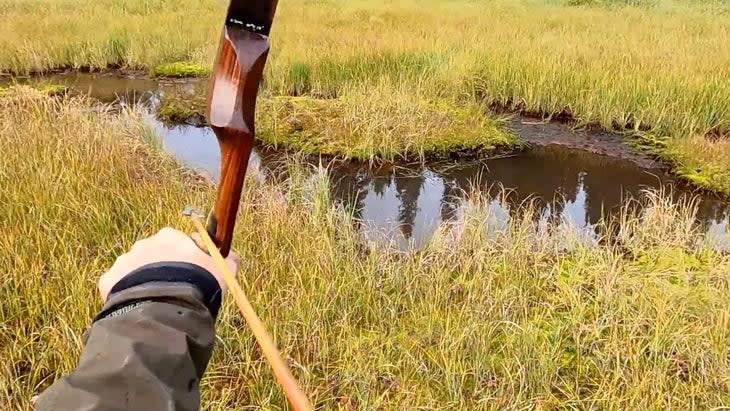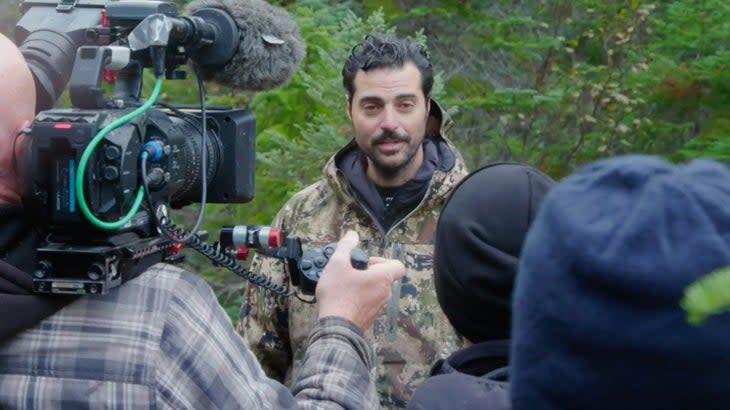Contestants on ‘Alone’ May Have Found the Perfect Backcountry Food
This article originally appeared on Outside
Squirrel steak is too tough; snail puree, too squishy. Muskrat flambe could make you sick, and don't get me started on the challenge of finding a good moose burger.
As a superfan of the History Channel's reality survival show Alone, I've learned that the perfect bushcraft cuisine simply does not exist, and that every wilderness meal has flaws. Some imperfections are due to a food's seasonality: berries and mushrooms die once the snow begins to fall, and fish disappear after rivers and lakes freeze over. Other problems are caused by scarcity or size: a musk ox may provide months' worth of dinners, but killing one is nearly impossible. Catching a mouse is comparatively easy, but eating one brings in just 30 or so calories.
Spoiler Alert
After watching the first two episodes of Alone's ninth season, held in coastal Labrador, Canada, I was somewhat unimpressed with the region's nourishments. Just two weeks in, some contestants were already barbecuing chipmunks and slurping down boiled seaweed to survive.
That changed during the final moments of episode three, when contestant Benji Hill, a pack-goat guide from Bellevue, Washington, discovered beaver tracks in a marsh. Hill crouched in the wetland with his hunting bow and waited. "The best strategy for hunting most game with bow and arrow is to find a high-traffic area and ambush them at close range," Hill said into the camera.

Then he did just that. When a furry mammal eventually paddled into view, Hill shot it twice and appeared to be moments away from enjoying a meal of delicious beaver chops. Alas, Hill could not locate his kill before the sun went down, and the episode ended on a cliff-hanger.
In the opening minutes of Thursday night's fourth episode, Hill found the dead beaver. The animal was the size of a manhole cover, and it was padded by a valuable layer of fat. Hill gutted it, cooked a tasty dinner for himself, and smoked and preserved enough meat to seemingly last him several weeks. Then, in the closing minutes of the episode, cast member Terry Burns of Homer, Alaska, shot a beaver with an arrow as it swam in an icy river. Like Hill, Burns was rewarded with what appeared to weeks' worth of food.
The episode made me wonder: Is beaver the perfect Alone cuisine? In previous seasons, we've watched winning contestants rely on bunnies or salmon for sustenance, since both animals provide meals for days. A 30-pound beaver is much larger than a rabbit or fish, and its greasy meat appears to have substantially more fat--perhaps the most important fuel source in the wild. Canada's Department of Health and Social Services even publishes this handy document breaking down a beaver's impressive nutritional qualities.
But unlike bigger game, such as deer or moose, beavers seem to be easier to hunt. They are slow and apparently oblivious to a hungry human standing a few paces away. We've seen two cast members harvest true big game during Alone's nine-season run, and both hunts looked impossibly hard to pull off. In season seven, Roland Welker wounded a musk ox with an arrow before ultimately stabbing it to death with a hunting knife and his bare hands. And in season six, Jordan Jonas felled a moose on the banks of Canada's Great Slave Lake with an arrow.
I recently spoke with Jonas, who explained just how time-consuming and difficult it was to catch the giant beast. Jonas spent 20 days scouting his region for moose tracks. He built a makeshift series of corrals and fences to steer moose into one area, fashioned a string of tin cans to operate as an alarm system, and then he waited.
"From the day they dropped me off, I was working my butt off to try and create some kind of encounter with a big animal. It was all geared toward that," Jonas said. "It's a huge gamble. If I missed the shot or stepped on a twig, you blow the whole thing."
From the cushy perspective of my living-room couch, killing a beaver seems like a significantly easier task. There was no stabbing, and Burns said he invested a week stalking the beaver, not three. His experience did reveal a major flaw in hunting beaver, though: After he shot the beaver, it floated lifelessly in a chest-deep lake. So Burns had to wade into 31-degree water to retrieve the animal. Imagine entering your favorite restaurant only to learn that you must take a dip in an ice bath before receiving your steak.
"Mother, I'm sorry you have to see this," Burns told the camera as he stripped down to his skivvies and waded into the frigid depths.
The Agony of Leaving Early
In episode four, we saw a second contestant call it quits: Igor Limansky of Salt Lake City tapped out on on day 20, joining Jacques Turcotte of Juneau, Alaska, who left on day 15. Limansky made a critical error that cost him dearly--he never secured a good source of protein, and instead focused his efforts on building a shelter made from heavy, thick trees. After nearly three weeks of hauling wood while eating almost nothing except for seaweed, Limansky's body gave out before his hut was even halfway complete. "This is so personal and public, because everyone is going to watch this and have an opinion on it," he said as rescue crews collected him.

Every season on Alone, there are contestants who depart early, and those scenes are usually more bitter than sweet. It's easy to understand why. Most cast members plan to to stay out there for months, and those who leave after a few days feel disappointed and embarrassed. As it turns out, it can take weeks or even years to overcome these emotions.
I recently called Jim Shields, a wilderness-skills teacher from Pennsylvania who was the first contestant to bail out during season three, after spending just three days camping along a river in Patagonia. Sheilds and his wife had been immersed in the process of adopting three children when he departed for the show, and the emotional stress of being away at such an important time ultimately did him in. Sheilds said he wrestled with the decision each day in the bush.
"I was angry at myself for going this far with the show instead of being home with my wife. I had a ton of emotions, and I saw this little button I could press and just go back home," Shields said. "I sat there with it for hours and was like, Dude, don't do it--you're a loser. But you have to go back home because you're not supposed to be here."
After calling to be rescued, Sheilds suffered an intense feeling of shame, which lingered for months. He felt it on the boat ride back to civilization and during the two-week process of undergoing safety checks and then traveling back home. Shields had taken months off from his teaching job and arrived back in the States with no work to distract him from his angst.
"You get this golden ticket, this huge opportunity to pursue your passion out there, and you absolutely think about that when you press the button to go home," Shields said. "You know it's over, and getting past it takes a long time."
What eventually helped Shields move past his shame and disappointment was the arrival of his adopted children. But it took him a few years to overcome the negative feelings he had of the experience as a whole. Now, six years later, Sheilds is happy he participated. But he still wonders how long he could have survived.
"What if it had been a different time in my life?" Shields said. "I'd like to say I don't think about that anymore, but I still do."
For exclusive access to all of our fitness, gear, adventure, and travel stories, plus discounts on trips, events, and gear, sign up for Outside+ today.

